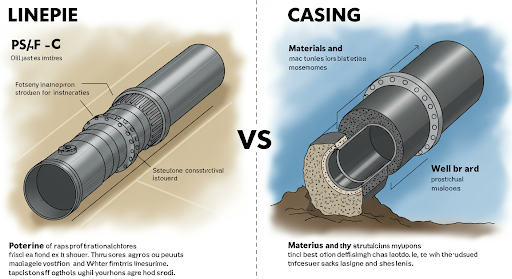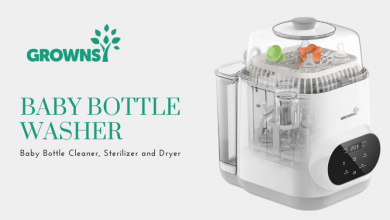Linepipe vs Casing: What's the Difference?

Choosing the right steel for your oil and gas projects is key. BalingSteel offers both oil casing and linepipe worldwide. They make sure the materials fit your needs. This guide will show you how each product is used in drilling and pipelines.
Knowing the difference helps avoid mistakes in well safety and fluid transport. Whether you’re setting up drilling structures or pipeline networks, this guide is essential. It helps you decide between oil casing and linepipe.
Key Takeaways
- Oil casing forms the wellbore’s structural foundation during drilling.
- Linepipe transports fluids between production facilities.
- Material grades directly impact project safety and longevity.
- BalingSteel offers certified products for Nigerian energy projects.
- Contact us for oil casing quotations tailored to your specifications.
Understanding Oil Casing and Linepipe
Working on oil and gas projects means knowing about oil casing and linepipe. These parts are key to drilling and pipeline systems. Let’s look at how they differ and why it’s important.
Defining Oil Casing
Oil casing is the main structure of oil wells. It keeps the well from collapsing and keeps fluids separate. It has:
- Heavy walls for deep wells
- Can handle up to 20,000 psi in tough formations
- Connections that are threaded or welded for a tight seal
What is Linepipe?
Linepipe carries fluids over land. It’s made for use above ground. It focuses on:
- Coatings to fight corrosion outdoors
- Flexibility for long pipelines
- Lighter than casing for easier setup
Key Material Specifications
API 5L and API 5CT standards are followed. BalingSteel provides products like X65-X80, fitting Nigerian projects. Our team can guide you in picking the right steel for your project.
Choosing the right product is key for safety and cost. Reach out to BalingSteel for custom solutions and great prices.

What’s the Different Between Linepipe and Casing?
Choosing between oil casing and linepipe depends on their roles. Here’s a simple explanation of their main differences:
- Design: Linepipe is made for transport systems, with thinner walls for better fluid flow. Oil casing has thicker walls to handle high pressures underground.
- Function: Linepipe connects facilities, moving oil/gas through pipelines. Casing holds wells together, preventing collapse and keeping geological layers separate.
- Use Cases: Linepipe is best for long-distance pipelines. Casing is key for wellbore construction in drilling.
Your project’s needs decide the best choice. For instance, offshore pipelines need linepipe’s flexibility. Deep wells require casing’s strength. Using the wrong one can cause leaks, failures, or expensive downtime.
BalingSteel provides both oil casing and linepipe, meeting global standards. Reach out to us to talk about your project. We’ll find the perfect match for durability and compliance.
Applications and Benefits for Your Oil and Gas Projects
Choosing the right steel products is key for your projects. Linepipe and casing have unique roles in oil and gas. Let’s look at their uses and how they help projects succeed.

Practical Uses in the Oil & Gas Industry
Linepipe is great for moving crude oil and gas over long distances. Pipelines made from linepipe can handle tough environments well. This means fewer leaks and less maintenance.
Casing keeps wellbores stable during drilling. It stops them from collapsing and keeps them clean.
| Application Area | Usage Example |
| Transportation | Long-distance linepipe networks |
| Drilling | Casing for wellbore structural support |
Benefits for Your Project Success
- Cost savings through durable materials
- Enhanced safety with certified steel grades
- Global supply chain reliability
“BalingSteel’s linepipe and casing meet international standards, ensuring compliance with Nigerian oil regulations.” – Project Manager, BalingSteel
Working with BalingSteel means you get certified products for Nigerian conditions. Their linepipe solutions last longer in corrosive areas. For quotes or project advice, reach out to their team today.
How BalingSteel Supports Your Global Projects
At BalingSteel, we offer oil casing and linepipe solutions for your projects. Whether you’re in Nigeria or other parts of the world, our products are reliable and durable. They meet international standards.
- Global supply chain for fast delivery to Nigeria and beyond
- Custom specifications to match your drilling and pipeline requirements
- 24/7 technical support for real-time project challenges
| Product | Application | Key Features |
| Oil Casing | Wellbore integrity in harsh environments | Corrosion-resistant, API-certified |
| Linepipe | Long-distance fluid transmission | Seamless design, high pressure tolerance |
“Quality materials are the foundation of every successful project.” — BalingSteel Engineering Team
Our team works closely with your engineers. We make sure oil casing and linepipe choices fit your project goals. For projects in Nigeria, we follow local rules while keeping quality high.
Contact us today for a linepipe quote or to talk about your global projects. Let BalingSteel be your reliable partner for infrastructure worldwide.
Comparing Performance: Oil Casing vs. Linepipe
Choosing the right material is key to a successful project. Let’s look at how oil casing and linepipe compare:
Technical Performance Metrics
Pressure and strength are crucial in tough environments.
- Pressure Ratings: Oil casing can handle up to 20,000 psi for deep wells. Linepipe works at 10,000 psi for surface lines.
- Corrosion Resistance: Both follow API 5CT and API 5L standards. But, casing grades (J55, N80) often do better in Nigeria’s corrosive soil.
Cost-Effectiveness and Durability
Long-term savings come from lifecycle costs:
- Upfront Costs: Linepipe is less expensive per meter but might need more frequent replacements in harsh areas.
- Longevity: Oil casing can last over 20 years in wells. Linepipe usually lasts 10–15 years in pipelines.
Considerations for Your Project Needs
Think about these before making a choice:
- Is it for deep drilling (casing) or surface transport (linepipe)?
- Do you value initial savings or long-term reliability more?
“Project delays cost Nigerian operators $1.2 million daily on average. Precision in material choice prevents these losses.” – 2023 Oil & Gas Nigeria Report
BalingSteel offers both materials, meeting Nigerian standards. Reach out to match your needs with cost and performance. Let us make your choice easier today.
Conclusion
Choosing the right material for your oil and gas projects is key. Oil casing strengthens wellbores, while linepipe transports fluids. Each is crucial for different parts of your operations. The right choice ensures your project is safe, cost-effective, and performs well.
BalingSteel offers both oil casing and linepipe to customers globally. Our materials meet international standards and are built to last in tough conditions. Whether you’re in Nigeria or elsewhere, we offer custom solutions for your project’s needs.
Ready to move forward? Contact BalingSteel today to talk about your needs and get quotes. We’re here to help you pick the best materials for your oil and gas projects. With our knowledge and quality products, we support your success from start to finish.
FAQ
What is the primary difference between oil casing and linepipe?
Oil casing supports and protects the borehole during drilling. Linepipe, on the other hand, carries fluids in the oil and gas industry. Knowing these differences helps choose the right product for your project.
Can you explain the applications of oil casing in the industry?
Oil casing keeps the wellbore stable, prevents collapse, and separates pressure zones. It’s key for safe and efficient drilling.
What are the material specifications for linepipe?
Linepipe is made from strong steel to handle high pressures and corrosive environments. It must meet standards for thickness, diameter, and material grade for reliable use.
How does the cost-effectiveness of oil casing compare to linepipe?
Oil casing is pricier due to its specialized design and materials. But linepipe is more affordable for long-distance transport.
What factors should I consider when choosing between linepipe and casing for my project?
Consider your project’s needs, like operating pressure and environmental conditions. Also, think about performance and durability to make your choice.
How can BalingSteel assist in procuring oil casing and linepipe?
BalingSteel offers top-quality oil casing and linepipe for your project. They’re reliable, global, and provide timely deliveries and fair prices.
Are there any warranties or quality assurances available for your products?
Yes, BalingSteel provides warranties and quality assurances. You’ll get materials that meet standards and work well in your applications.





